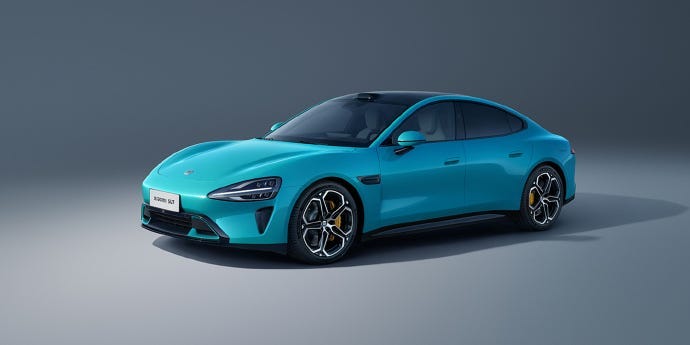The Beijing-based smartphone maker Xiaomi is set to do what Apple could not after it announced plans to start selling its first line of EVs, the Speed Ultra 7 — known as the SU7 — on March 28 in nearly 30 cities across China.
For Lei Jun, Xiaomi’s billionaire cofounder and CEO, the launch marks an extraordinary feat: His EVs managed to go on sale just three years after his company said it was venturing beyond consumer electronics into EVs.
ChinaFotoPress/Getty Images
In December, Lei wrote on X about his experience driving 100 cars to “learn from the strengths of each one” and gain the “firsthand experience” he felt necessary to build a competitive car. The effort may have paid off: Xiaomi has said the SU7 can go from zero to 100 kph in 2.78 seconds.
“As we approach the 3rd anniversary of our EV-manufacturing journey, ‘Fight for Xiaomi EV’ continues to fuel me and the team. We remain determined to make a great car!” the Xiaomi CEO said on X.
Like Apple, Xiaomi is best known for selling smartphones. Data from Counterpoint Research found that in the first six weeks of the year, Xiaomi has a 13.8% share of the smartphone market in China, putting it just behind Apple’s 15.7%.
So it’s worth asking how Xiaomi has managed to do what Apple spent a decade trying to do.
Apple’s decision to end its EV project came after running into several production issues that pushed the company to consider a less ambitious design for its autonomous vehicles, having already risked delaying a launch until at least 2028.
Bloomberg reported that in 2020, Apple got an autonomous minivan prototype nicknamed the “Bread Loaf” up and running at a testing track in Arizona. But with a lot more work needed, it became increasingly difficult for Apple to justify spending roughly $1 billion annually on the car program.
Xiaomi, meanwhile, has managed to use the existing EV industry base in China to its favor.
Xiaomi has benefited from a partnership with the Beijing Automotive Group, which allowed the company to quickly access a manufacturing permit, per Bloomberg. The partnership could help Xiaomi build about 200,000 EVs a year.
FLORENCE LO/REUTERS
Of course, Xiaomi isn’t guaranteed success just because it’s ready to sell EVs now.
The market for EVs has been on the decline, and rival carmakers like Tesla and BYD are engaged in a price war to entice consumers.
Xiaomi, which has yet to announce a price for its SU7, is looking to target the “premium” market. That could prove to be a challenge in China, where EV makers are battling slowing demand.
Still, Xiaomi has managed to pull off something Apple dreamed about for 10 years. Tim Cook might have to look on from Cupertino to see what could have been.




